小六英语第11讲:情态动词(1)
- 格式:docx
- 大小:34.70 KB
- 文档页数:10
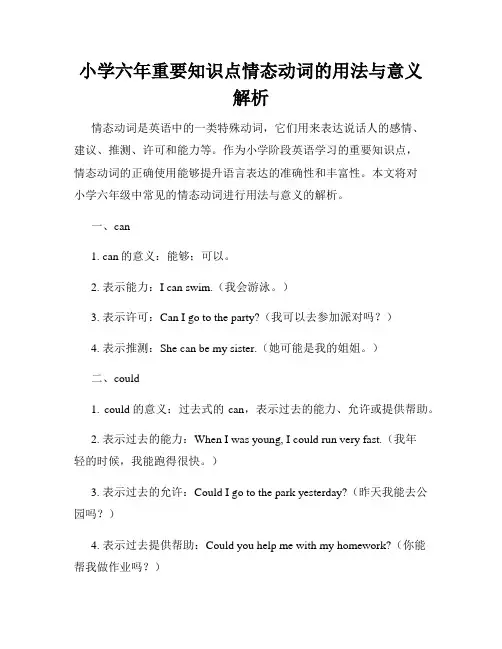
小学六年重要知识点情态动词的用法与意义解析情态动词是英语中的一类特殊动词,它们用来表达说话人的感情、建议、推测、许可和能力等。
作为小学阶段英语学习的重要知识点,情态动词的正确使用能够提升语言表达的准确性和丰富性。
本文将对小学六年级中常见的情态动词进行用法与意义的解析。
一、can1. can的意义:能够;可以。
2. 表示能力:I can swim.(我会游泳。
)3. 表示许可:Can I go to the party?(我可以去参加派对吗?)4. 表示推测:She can be my sister.(她可能是我的姐姐。
)二、could1. could的意义:过去式的can,表示过去的能力、允许或提供帮助。
2. 表示过去的能力:When I was young, I could run very fast.(我年轻的时候,我能跑得很快。
)3. 表示过去的允许:Could I go to the park yesterday?(昨天我能去公园吗?)4. 表示过去提供帮助:Could you help me with my homework?(你能帮我做作业吗?)1. may的意义:可能;可以;允许。
2. 表示可能性:It may rain tomorrow.(明天可能会下雨。
)3. 表示许可:May I borrow your pencil?(我可以借用你的铅笔吗?)四、must1. must的意义:必须。
2. 表示必须:You must finish your homework before watching TV.(你必须先完成作业再看电视。
)五、shall1. shall的意义:将要;应当。
2. 表示将要:We shall go camping next week.(我们下周将要去野营。
)3. 表示应当:We shall help others in need.(我们应该帮助需要帮助的人。
)六、should1. should的意义:应该。
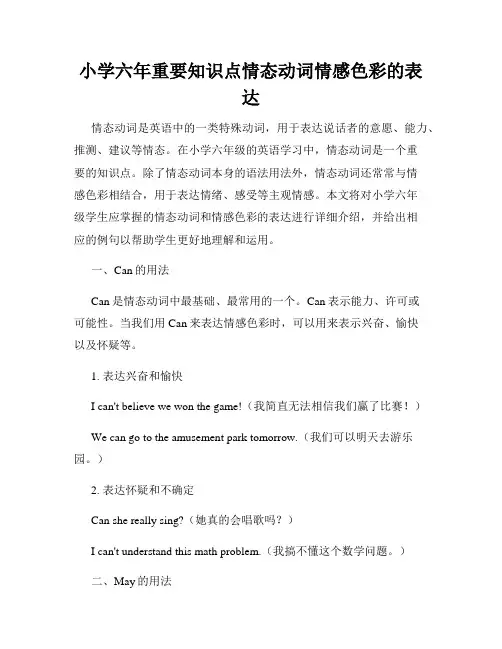
小学六年重要知识点情态动词情感色彩的表达情态动词是英语中的一类特殊动词,用于表达说话者的意愿、能力、推测、建议等情态。
在小学六年级的英语学习中,情态动词是一个重要的知识点。
除了情态动词本身的语法用法外,情态动词还常常与情感色彩相结合,用于表达情绪、感受等主观情感。
本文将对小学六年级学生应掌握的情态动词和情感色彩的表达进行详细介绍,并给出相应的例句以帮助学生更好地理解和运用。
一、Can的用法Can是情态动词中最基础、最常用的一个。
Can表示能力、许可或可能性。
当我们用Can来表达情感色彩时,可以用来表示兴奋、愉快以及怀疑等。
1. 表达兴奋和愉快I can't believe we won the game!(我简直无法相信我们赢了比赛!)We can go to the amusement park tomorrow.(我们可以明天去游乐园。
)2. 表达怀疑和不确定Can she really sing?(她真的会唱歌吗?)I can't understand this math problem.(我搞不懂这个数学问题。
)二、May的用法May表示可能性、请求和许可。
当我们用May来表达情感色彩时,可以用来表示恐惧、担心以及委婉表达。
1. 表达恐惧和担心I may be late for the meeting.(我可能会迟到开会。
)He may not pass the exam.(他可能考不及格。
)2. 委婉地表达请求和建议May I borrow your pen, please?(我能借用一下你的钢笔吗?)You may want to consider taking a break.(你可以考虑休息一下。
)三、Must的用法Must表示必须、肯定和推测的过去。
当我们用Must来表达情感色彩时,可以用来表示责任、紧迫感以及推测和假设。
1. 表达责任和紧迫感We must clean our room before Mom comes back.(妈妈回来之前我们必须把房间整理干净。
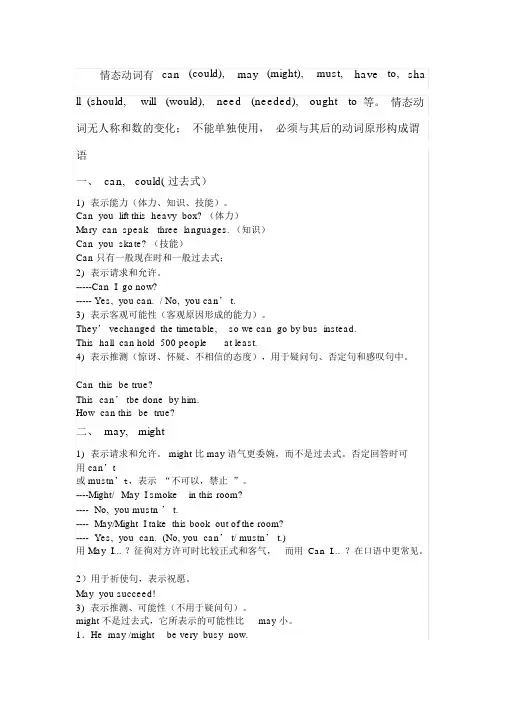
情态动词有can (could), may (might), must, have to, sha ll (should, will (would), need (needed), ought to 等。
情态动词无人称和数的变化;不能单独使用,必须与其后的动词原形构成谓语一、 can, could( 过去式)1)表示能力(体力、知识、技能)。
Can you lift this heavy box? (体力)Mary can speak three languages. (知识)Can you skate? (技能)Can 只有一般现在时和一般过去式;2)表示请求和允许。
-----Can I go now?----- Yes, you can. / No, you can’ t.3)表示客观可能性(客观原因形成的能力)。
They’ vechanged the timetable, so we can go by bus instead.This hall can hold 500 people at least.4)表示推测(惊讶、怀疑、不相信的态度),用于疑问句、否定句和感叹句中。
Can this be true?This can’ tbe done by him.How can this be true?二、 may,might1)表示请求和允许。
might 比 may 语气更委婉,而不是过去式。
否定回答时可用 can’t或 mustn’t,表示“不可以,禁止”。
----Might/ May I smoke in this room?----No, you mustn ’ t.----May/Might I take this book out of the room?----Yes, you can. (No, you can’ t/ mustn’ t.)用 May I... ?征徇对方许可时比较正式和客气,而用Can I...?在口语中更常见。
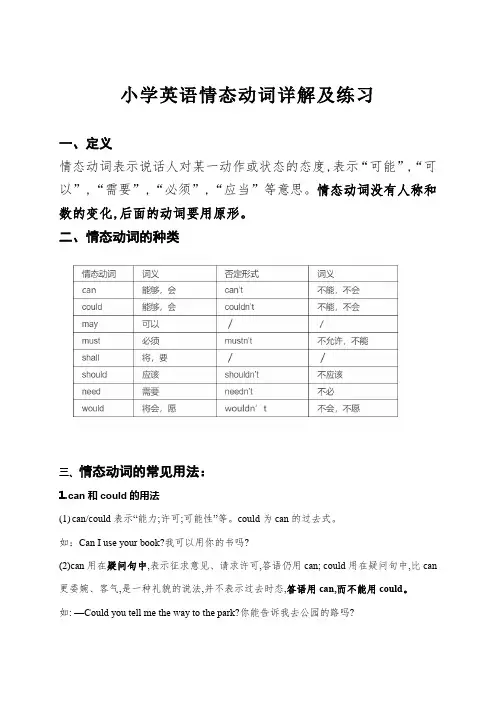
小学英语情态动词详解及练习一、定义情态动词表示说话人对某一动作或状态的态度,表示“可能”,“可以”,“需要”,“必须”,“应当”等意思。
情态动词没有人称和数的变化,后面的动词要用原形。
二、情态动词的种类三、情态动词的常见用法:1.can和could的用法(1)can/could表示“能力;许可;可能性”等。
could为can的过去式。
如:Can I use your book?我可以用你的书吗?(2)can用在疑问句中,表示征求意见、请求许可,答语仍用can; could用在疑问句中,比can 更委婉、客气,是一种礼貌的说法,并不表示过去时态,答语用can,而不能用could。
如: —Could you tell me the way to the park?你能告诉我去公园的路吗?—Sorry. I can't. I'm new here.不好意思,我不知道。
我是新来的。
[注意]①can和could只能用于现在时和过去时两种时态。
②另外,can't可表示否定推测。
2.may和might的用法may/might意为“可以”,表示同意、许可或请求对方许可,也可表示祝愿。
might是may的过去式,有两种用法:一种表示过去式;一种表示虚拟语气,使语气更加委婉、客气,或表示可能性更小。
以may开头的一般疑问句,其否定回答用mustn't。
如: May I use your book? 我可以用你用的书吗?He might be alive.他可能还活着。
【注意】can和may都可以用来表示请求或允许,但may比can更正式,更客气。
3.must和shouldmust意为“必须,应当”,含有一种命令的语气,比较生硬,不容商量。
否定形式mustn't, 表示“不得”,“一定不要”。
如:You mustn't drive after drinking.你绝不能酒后驾车。
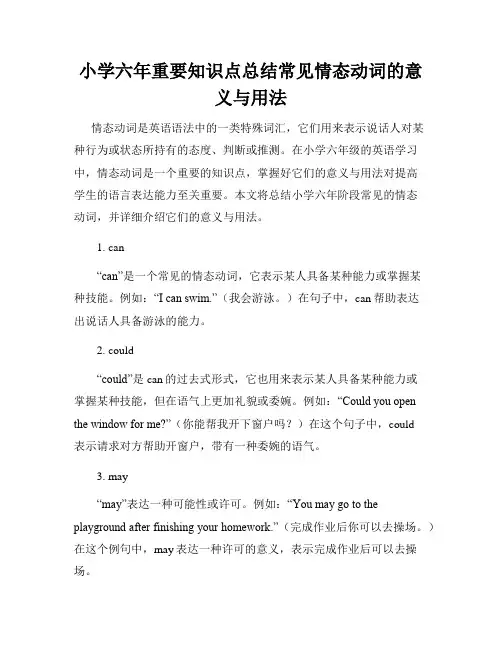
小学六年重要知识点总结常见情态动词的意义与用法情态动词是英语语法中的一类特殊词汇,它们用来表示说话人对某种行为或状态所持有的态度、判断或推测。
在小学六年级的英语学习中,情态动词是一个重要的知识点,掌握好它们的意义与用法对提高学生的语言表达能力至关重要。
本文将总结小学六年阶段常见的情态动词,并详细介绍它们的意义与用法。
1. can“can”是一个常见的情态动词,它表示某人具备某种能力或掌握某种技能。
例如:“I can swim.”(我会游泳。
)在句子中,can帮助表达出说话人具备游泳的能力。
2. could“could”是can的过去式形式,它也用来表示某人具备某种能力或掌握某种技能,但在语气上更加礼貌或委婉。
例如:“Could you open the window for me?”(你能帮我开下窗户吗?)在这个句子中,could表示请求对方帮助开窗户,带有一种委婉的语气。
3. may“may”表达一种可能性或许可。
例如:“You may go to the playground after finishing your homework.”(完成作业后你可以去操场。
)在这个例句中,may表达一种许可的意义,表示完成作业后可以去操场。
4. might“might”与may有相似的意义,表示一种可能性,但语气稍弱。
例如:“It might rain tomorrow.”(明天可能会下雨。
)在这个句子中,might表示明天可能下雨。
5. must“must”表示一种肯定的推测或必要性。
例如:“The test is tomorrow, you must study hard.”(明天就要考试了,你必须努力学习。
)在句子中,must表示肯定的推测,也可以用来表示必要性。
6. shall“shall”常用于提出建议或表达将来。
例如:“Shall we go to the park this weekend?”(这个周末我们去公园好吗?)在这个例句中,shall表示提出建议。
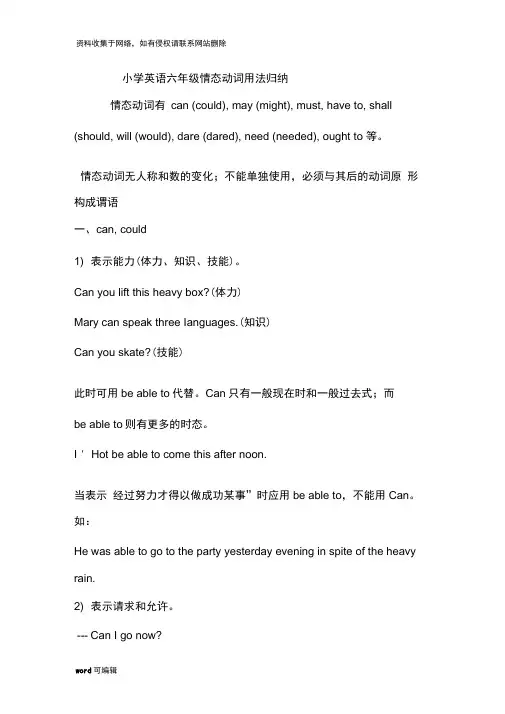
小学英语六年级情态动词用法归纳情态动词有can (could), may (might), must, have to, shall (should, will (would), dare (dared), need (needed), ought to 等。
情态动词无人称和数的变化;不能单独使用,必须与其后的动词原形构成谓语一、can, could1) 表示能力(体力、知识、技能)。
Can you lift this heavy box?(体力)Mary can speak three Ianguages.(知识)Can you skate?(技能)此时可用be able to代替。
Can只有一般现在时和一般过去式;而be able to则有更多的时态。
I ' Hot be able to come this after noon.当表示经过努力才得以做成功某事”时应用be able to,不能用Can。
如:He was able to go to the party yesterday evening in spite of the heavy rain.2) 表示请求和允许。
--- Can I go now?——Yes, you can. / No, you can' t.此时可与may互换。
在疑问句中还可用could,might代替,不是过去式,只是语气更委婉,不能用于肯定句和答语中。
——Could I come to see you tomorrow?----Yes, you can. ( No, I ' mfraid not.)3)表示客观可能性(客观原因形成的能力)。
They' vecha nged the timetable, so we can go by bus in stead.This hall can hold 500 people at least.4)表示推测(惊讶、怀疑、不相信的态度),用于疑问句、否定句和感叹句中。
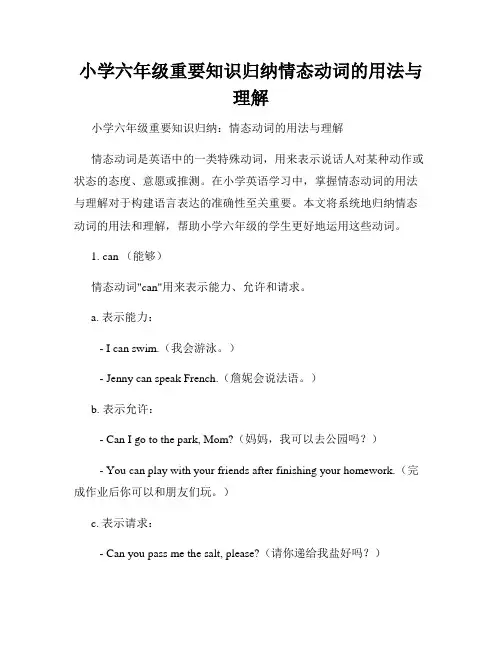
小学六年级重要知识归纳情态动词的用法与理解小学六年级重要知识归纳:情态动词的用法与理解情态动词是英语中的一类特殊动词,用来表示说话人对某种动作或状态的态度、意愿或推测。
在小学英语学习中,掌握情态动词的用法与理解对于构建语言表达的准确性至关重要。
本文将系统地归纳情态动词的用法和理解,帮助小学六年级的学生更好地运用这些动词。
1. can (能够)情态动词"can"用来表示能力、允许和请求。
a. 表示能力:- I can swim.(我会游泳。
)- Jenny can speak French.(詹妮会说法语。
)b. 表示允许:- Can I go to the park, Mom?(妈妈,我可以去公园吗?)- You can play with your friends after finishing your homework.(完成作业后你可以和朋友们玩。
)c. 表示请求:- Can you pass me the salt, please?(请你递给我盐好吗?)- Can you help me with my math homework?(你能帮我解数学作业吗?)2. could (过去式为"can",能够)情态动词"could"是"can"的过去式,用来表示过去的能力、允许和请求。
a. 表示过去的能力:- When I was younger, I could run very fast.(我年纪小的时候,我跑得很快。
)- My grandma could speak three languages.(我的奶奶会说三种语言。
)b. 表示过去的允许:- When I was on vacation, my parents said I could stay up late.(我度假时,父母说我可以晚睡。
)- The teacher said we could have extra time to finish the test.(老师说我们可以有额外的时间完成考试。
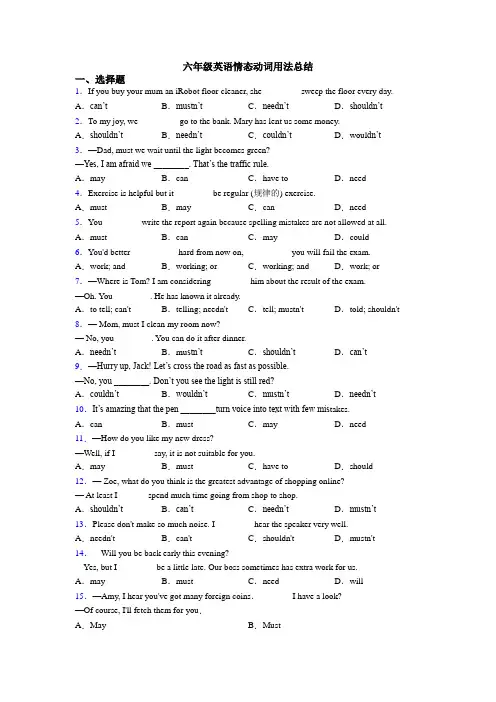
六年级英语情态动词用法总结一、选择题1.If you buy your mum an iRobot floor cleaner, she ________ sweep the floor every day. A.can’t B.mustn’t C.needn’t D.shouldn’t 2.To my joy, we_________ go to the bank. Mary has lent us some money. A.shouldn’t B.needn’t C.couldn’t D.woul dn’t 3.—Dad, must we wait until the light becomes green?—Yes, I am afraid we ________. That’s the traffic rule.A.may B.can C.have to D.need 4.Exercise is helpful but it ________ be regular (规律的) exercise.A.must B.may C.can D.need 5.You ________ write the report again because spelling mistakes are not allowed at all. A.must B.can C.may D.could 6.You'd better __________ hard from now on, __________ you will fail the exam. A.work; and B.working; or C.working; and D.work; or 7.—Where is Tom? I am considering ________ him about the result of the exam.—Oh. You ________. He has known it already.A.to tell; can't B.telling; needn't C.tell; mustn't D.told; shouldn't 8.— Mom, must I clean my room now?— No, you ________. You can do it after dinner.A.needn’t B.mu stn’t C.shouldn’t D.can’t 9.—Hurry up, Jack! Let’s cross the road as fast as possible.—No, you ________. Don’t you see the light is still red?A.couldn’t B.wouldn’t C.mustn’t D.needn’t 10.It’s amazing that the pen ________turn voice into text with few mis takes.A.can B.must C.may D.need 11.—How do you like my new dress?—Well, if I ________ say, it is not suitable for you.A.may B.must C.have to D.should 12.— Zoe, what do you think is the greatest advantage of shopping online?— At least I ______ spend much time going from shop to shop.A.shouldn’t B.can’t C.needn’t D.mustn’t 13.Please don't make so much noise. I ________ hear the speaker very well.A.needn't B.can't C.shouldn't D.mustn't 14.---Will you be back early this evening?---Yes, but I ________ be a little late. Our boss sometimes has extra work for us.A.may B.must C.need D.will 15.—Amy, I hear you've got many foreign coins._______ I have a look?—Of course, I'll fetch them for you.A.May B.MustC.Should D.Need16.When I was young, my father ___________ take me to climb the hill which was not far from our house.A.may B.must C.would D.should 17.—Would you please________in that way? That’s not safe!—Sorry. I won’t do it any more.A.not driving B.not to drive C.no driving D.not drive 18.Think twice before making a decision, or you __________ get into trouble.A.may B.can't C.shouldn't D.mustn't 19.Don’t cross the road until the traffic lights turn green. A car_______hit you.A.need B.may C.should D.must20.A lot of online resources ________ be used either by teachers at school or parents at home. A.can B.should C.need D.must21.Mr. Black ________ be at home now. He went abroad on vacation last Friday.A.can’t B.mustn’t C.needn’t D.shouldn’t 22.You _________ smoke here! Look at the sign. It says "No smoking".A.needn't B.mustn't C.can D.may23.We've discussed every detail of this plan and have got everything ready. But still something ________ go wrong. We still have to be very careful.A.must B.should C.would D.may24.Most young people like shopping online because they ________ spend much time going from shop to shop.A.needn’t B.can’t C.mustn’t D.shouldn’t 25.— Mum, why do I have to wash hands so many times a day?—You ________ be too careful, for your health.A.can’t B.mustn’t C.may not D.needn’t26.I think all the students love the weekends because, to them, they ________ get up early on Saturdays or Sundays.A.mustn’t B.don’t need C.needn’t D.can’t27.You ________ pay too much attention to protecting yourself if you plan to go abroad. A.mustn’t B.can’t C.shouldn’t D.needn’t 28.When people are waiting at the zebra crossing, cars and buses ________ wait and let them go first.A.must B.may C.can D.need 29.—There is a knock at the door.—It ________ be my mom. She always comes back home at this time.A.may B.may not C.must D.can’t30.You’ve got an A in the maths test again. You ________ be good at it.A.can B.may C.must D.should 31.—What is that young lady’s job?—She ________ be a nurse, I’m not sure.A.must B.may C.need D.would 32.—How beautiful the winter jasmines (迎春花) are!—Yes. These golden-yellow flowers ________ be widely seen in my city in March.A.must B.can C.would D.should33.— What do you think of the show yesterday?— Some of them were really good but others ________ be better.A.will B.must C.need D.can34.—In China, many students have to stay up late to do their homework.—No worries. The government has realized the problem. I’m sure there ________ be good news soon.A.can B.should C.must D.need 35.—Who’s the man over there? Is that Mr. Bla ck?—It ________ be him. Mr. Black is much taller than that man.A.may B.must C.can’t D.mustn’t 36.You ________ drive after drinking alcohol(酒). It’s against the law.A.mustn’t B.needn’t C.couldn’t D.wouldn’t37.—I think they are enough. We ________ make so many chairs.—I don’t think so. Because nearly a quarter of them need ________.A.don’t need to; mending B.needed; to be mendedC.don’t need; mend D.need; to mend38.We teenagers ________ have dreams. With dreams and hard work, anything amazing________ be created.A.may; can B.might; should C.should; can D.must; has to 39.—Who is singing next door? It sounds like a young girl’s voice.—It _________ be Jane. But she seldom sings English songs.A.need B.must C.may D.can40.Cars ________ give way to walkers on some roads in Binhai, or the drivers will be fined. A.may B.will C.can D.must【参考答案】一、选择题1.C解析:C【详解】句意:如果你给你妈妈买一台扫地机器人,她就不必每天扫地了。
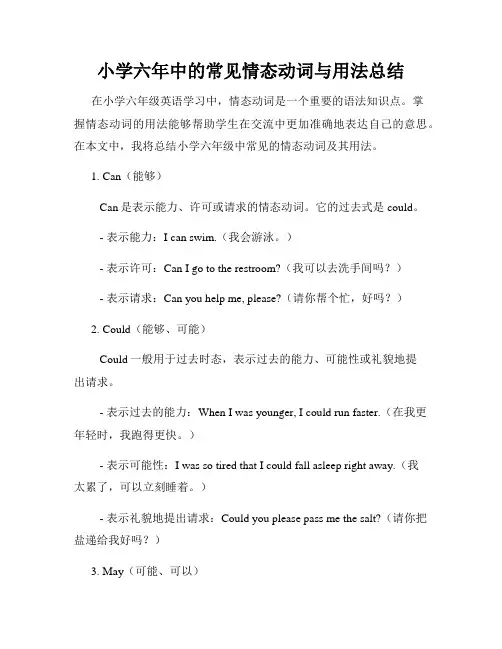
小学六年中的常见情态动词与用法总结在小学六年级英语学习中,情态动词是一个重要的语法知识点。
掌握情态动词的用法能够帮助学生在交流中更加准确地表达自己的意思。
在本文中,我将总结小学六年级中常见的情态动词及其用法。
1. Can(能够)Can是表示能力、许可或请求的情态动词。
它的过去式是could。
- 表示能力:I can swim.(我会游泳。
)- 表示许可:Can I go to the restroom?(我可以去洗手间吗?)- 表示请求:Can you help me, please?(请你帮个忙,好吗?)2. Could(能够、可能)Could一般用于过去时态,表示过去的能力、可能性或礼貌地提出请求。
- 表示过去的能力:When I was younger, I could run faster.(在我更年轻时,我跑得更快。
)- 表示可能性:I was so tired that I could fall asleep right away.(我太累了,可以立刻睡着。
)- 表示礼貌地提出请求:Could you please pass me the salt?(请你把盐递给我好吗?)3. May(可能、可以)May表示允许、可能或提出请求的意思。
- 表示允许:May I go to the library?(我可以去图书馆吗?)- 表示可能:It may rain later.(可能一会儿会下雨。
)- 表示提出请求:May I borrow your pen, please?(请问我可以借用你的笔吗?)4. Might(可能)Might表示较小的可能性,相比于may更加不确定。
- It might snow tomorrow.(明天可能会下雪。
)- She might be busy.(她可能很忙。
)5. Must(必须)Must表示强烈的义务或必须性。
必须是情态动词中唯一没有过去式的动词,过去时态中用had to来表示。
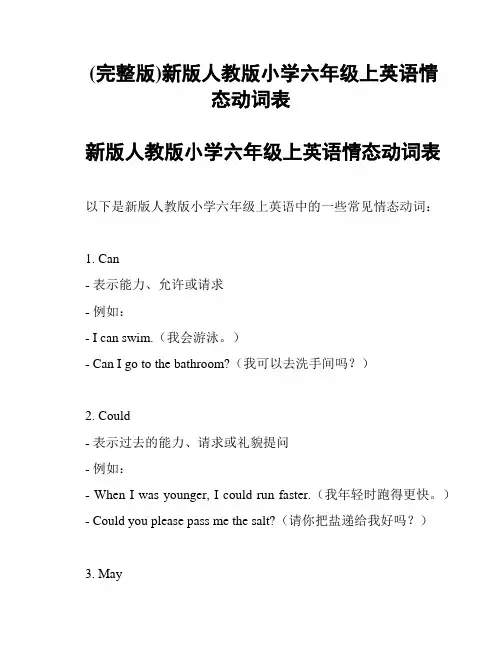
(完整版)新版人教版小学六年级上英语情态动词表新版人教版小学六年级上英语情态动词表以下是新版人教版小学六年级上英语中的一些常见情态动词:1. Can- 表示能力、允许或请求- 例如:- I can swim.(我会游泳。
)- Can I go to the bathroom?(我可以去洗手间吗?)2. Could- 表示过去的能力、请求或礼貌提问- 例如:- When I was younger, I could run faster.(我年轻时跑得更快。
)- Could you please pass me the salt?(请你把盐递给我好吗?)3. May- 表示允许、请求或可能性- 例如:- You may leave the classroom now.(你现在可以离开教室。
)- May I have a glass of water, please?(我可以请你给我一杯水吗?)4. Might- 与 may 相似,表示可能性,但较少使用- 例如:- It might rain later, so don't forget your umbrella.(可能会下雨,所以别忘了带伞。
)5. Must- 表示必须或推测- 例如:- You must finish your homework before playing games.(你必须先完成作业再去玩游戏。
)- He's wearing a coat, so it must be cold outside.(他穿着外套,所以外面肯定很冷。
)6. Should- 表示建议或期望- 例如:- You should brush your teeth twice a day.(你应该每天刷两次牙。
)- He should apologize for what he said.(他应该为他说的话道歉。
)7. Would- 表示愿意、过去的惯或虚拟语气- 例如:- Would you like some tea?(你想喝点茶吗?)- When I was young, I would visit my grandparents every summer.(我年轻时每年夏天都会去看望我的祖父母。
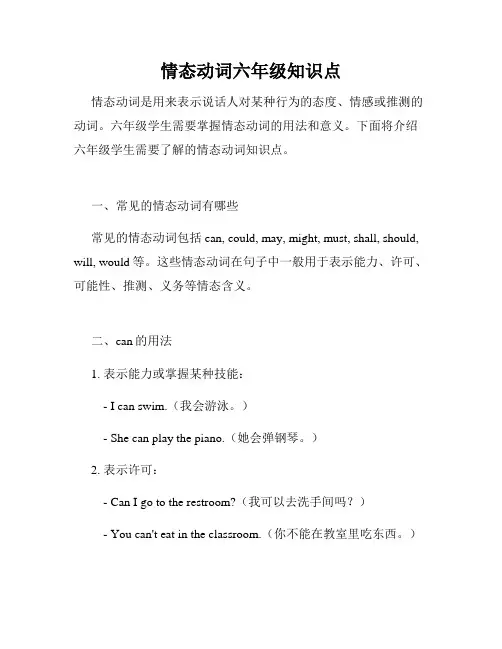
情态动词六年级知识点情态动词是用来表示说话人对某种行为的态度、情感或推测的动词。
六年级学生需要掌握情态动词的用法和意义。
下面将介绍六年级学生需要了解的情态动词知识点。
一、常见的情态动词有哪些常见的情态动词包括can, could, may, might, must, shall, should, will, would等。
这些情态动词在句子中一般用于表示能力、许可、可能性、推测、义务等情态含义。
二、can的用法1. 表示能力或掌握某种技能:- I can swim.(我会游泳。
)- She can play the piano.(她会弹钢琴。
)2. 表示许可:- Can I go to the restroom?(我可以去洗手间吗?)- You can't eat in the classroom.(你不能在教室里吃东西。
)三、could的用法1. 表示过去或将来某个时间的能力或允许性:- When I was young, I could run very fast.(小时候,我跑得很快。
)- Could you help me with my homework this evening?(你今晚能帮我做作业吗?)2. 表示礼貌地请求或征求意见:- Could you please pass me the salt?(请你把盐递给我,好吗?)- Could you tell me the way to the nearest post office?(你能告诉我去最近的邮局的路吗?)四、may的用法1. 表示许可:- May I go out and play with my friends?(我可以出去和朋友玩吗?)- You may not use your phone during class.(上课期间你不能使用手机。
)2. 表示可能性或推测:- It may rain tomorrow.(明天可能会下雨。
六年级情态动词知识点情态动词是英语中的一类特殊动词,它们可以用来表示说话人的态度、能力、推测、允许和义务等。
在六年级英语学习中,掌握情态动词的用法是很重要的。
本文将介绍六年级学生需要掌握的情态动词知识点。
1. 情态动词的定义和特点:情态动词是一种助动词,通常用来修饰主动词,表达说话人的态度、推测、允许和义务等。
情态动词有特殊的用法:它们没有人称和数的变化,后面直接跟动词原形。
2. can的用法:can表示能力,意为“能够”,常用于一般疑问句、否定句和陈述句中。
例如:- Can you swim?(你会游泳吗?)- I can't speak French.(我不会说法语。
)- She can play the piano.(她会弹钢琴。
)3. could的用法:could是can的过去式,也表示能力,意为“能够”。
它常用于过去的能力或者替代can表示委婉语气。
例如:- When I was young, I could run very fast.(当我年轻的时候,我能跑得很快。
)- Could you please close the window?(你能关上窗户吗?)4. may的用法:may表示许可或可能,意为“可以”或“可能”。
它通常用于询问和征求允许的句子。
例如:- May I go to the restroom?(我可以去洗手间吗?)- It may rain tomorrow.(明天可能会下雨。
)5. might的用法:might是may的过去式,表示过去某个时间可能发生的情况,或表示比may的可能性更小。
例如:- They thought it might snow yesterday, but it didn't.(他们觉得昨天可能会下雪,但没有下。
)- She might come to the party if she finishes her homework.(如果她完成了作业,她可能会来参加聚会。
外研版六年级情态动词的概念和用法一、选择题1.You ________ write the report again because spelling mistakes are not allowed at all. A.must B.can C.may D.could2.To my joy, we_________ go to the bank. Mary has lent us some money.A.shouldn’t B.needn’t C.couldn’t D.wouldn’t 3.You ________ require others to do with the problem like you. Everyone has his own way. A.mustn’t B.needn’t C.may not D.shouldn’t 4.— Excuse me, could you tell me where the Nanjing Brocade Museum is?— Go along this road for five minutes. You ________ miss it. It’s a huge building. A.mustn’t B.can’t C.needn’t D.shouldn’t 5.—Must the children leave at six tomorrow morning?—No, they _______. They can have more time to get ready for the trip.A.can’t B.needn’t C.mustn’t D.may not 6.—Why didn’t you tell it to me earlier?— Why ________ I? I want to have my own secret.A.can B.may C.should D.shall 7.—There is a knock at the door.—It ________ be my mom. She always comes back home at this time.A.may B.may not C.must D.can’t8.We shouldn’t throw any objects from the building. Even a small object ________ cause serious injuries or death, when dropped from a great height.A.must B.should C.may D.need9.—Do we have to finish this today?—Yes, you ________ . Today is the last day.A.would B.may C.can D.must 10.— Is Lang Lang going to perform at Art Center this Friday?— Yes. It ________ be him. He has been here for three days.A.might B.must C.mustn’t D.may 11.—Who’s singing next door? Is it Miss Wang?—It ________ be her. She’s having the board meeting.A.can’t B.shou ldn’t C.mustn’t D.needn’t 12.— Mom, must I clean my room now?— No, you ________. You can do it after dinner.A.needn’t B.mustn’t C.shouldn’t D.can’t13.It’s amazing that the pen ________turn voice into text with few mistakes.A.can B.must C.may D.need 14.—The high school entrance examination is coming!—Yes, our teacher tells us we _______ be too careful while taking exams.A.mustn't B.shouldn't C.needn't D.can't15.We’ve discussed every detail of this plan and have got everything ready. But still somethin g __________ go wrong. We still have to be very careful.A.must B.should C.would D.may16.You ______ pay too much attention to your pronunciation, as it is so important in the oral (口头的) test.A.shouldn’t B.mustn’t C.can’t D.needn’t 17.—Shall we go camping this summer holiday?—Nothing________be better.A.should B.could C.must D.may18.Dr. Zhong Nanshan once said, "To prevent the spread of this disease, we________never be too careful."A.can B.may C.must D.should 19.Don’t cross the road until the traffic lig hts turn green. A car_______hit you.A.need B.may C.should D.must 20.—Dad, must we wait until the light becomes green?—Yes, I am afraid we ________. That’s the traffic rule.A.may B.can C.have to D.need 21.—Excuse me. I haven’t finished reading the book yet. May I keep it a bit longer?— Sorry, you ________. You must return it on time.A.needn’t B.can’t C.won’t D.shouldn’t 22.You _________ smoke here! Look at the sign. It says "No smoking".A.needn't B.mustn't C.can D.may 23.—Must I finish all my homework today, Mum?—No, you ________, my dear. You can finish some tomorrow if you like.A.needn’t B.shouldn’t C.can’t D.mustn’t 24.Never throw objects from the building. Even a small object ________ cause serious injuries, or death, when dropped from a great height.A.must B.should C.may D.need25.—Will Jim come to Yangzhou for a holiday?—He ________come and it depends on how much homework he will have.A.may B.should C.must D.need26.— Is the boy over there Tom? He often wears a jacket like that.— It _______ be him. He is absent from school today.A.needn’t B.shouldn’t C.mustn’t D.can’t27.You ________ pay too much attention to protecting yourself if you plan to go abroad. A.mustn’t B.can’t C.shouldn’t D.needn’t 28.—Shall I tell him the change of the time right now?—I’m afraid you ________, otherwise he will be late for the meeting.A.can B.may C.must D.need29.Hurry up, or we ________ miss the beginning of the film.A.should B.must C.may D.have to 30.—Must we stop the Japanese government discharging nuclear waste water (排放核污水) into the Pacific Ocean?—________. Because everyone should protect our earth and it is bad ________ us to eat the polluted seafood and drink the waste water.A.Yes, we can; of B.No, we mustn’t; of C.Yes, we must; for D.No, we needn’t; f or 31.A hard-working man ________ become a great scientist, but a great scientist ________ be a hard-working man.A.can’t; can B.may not; must C.can’t; must D.may not; can 32.Sometimes smiles ________ be false, hiding other feelings like anger, fear or worry. A.should B.would C.must D.can33.Mr. Black ________ be at home now. He went abroad on vacation last Friday.A.can’t B.mustn’t C.needn’t D.shouldn’t 34.— The sandstorm in Beijing is so serious this year.— Yes, I wonder when we ________ worry about the air we breathe.A.can’t B.mustn’t C.needn’t D.shouldn’t 35.—Could you tell me how to renew the library books?—With pleasure. You ________ come to our desk every time. It’s easier to renew them online. A.can’t B.mustn’t C.needn’t D.shouldn’t36.For the safety of the passengers, objects like guns ________ be carried on board.A.may not B.needn’t C.might not D.mustn’t 37.—Who’s the man over there? Is that Mr. Black?—It ________ be him. Mr. Black is much taller than that man.A.may B.must C.can’t D.mustn’t38.—I don’t care what people think.—Well, you _______ . Some opinions are worth weighing.A.should B.might C.could D.would39.We teenagers ________ have dreams. With dreams and hard work, anything amazing________ be created.A.may; can B.might; should C.should; can D.must; has to 40.—Will dad arrive home at 6 o’clock to have dinner with us this evening?— I think he will, but he ________ not. Sometimes he works extra hours.A.can B.must C.need D.may【参考答案】一、选择题1.A解析:A【详解】句意:你必须重新写报告,因为根本不允许有拼写错误。
人教版六年级英语情态动词的用法一、选择题1.It’s amazing that the pen ________turn voice into text with few mistakes.A.can B.must C.may D.need 2.Think twice before making a decision, or you __________ get into trouble.A.may B.can't C.shouldn't D.mustn't 3.—Mum, why do I have to wear a mask before entering the supermarket?—For your health and safety, you ________ be too careful.A.shouldn’t B.can’t C.mustn’t D.needn’t 4.—Hurry up, Jack! Let’s cross the road as fast as possible.—No, you ________. Don’t you see the light is s till red?A.couldn’t B.wouldn’t C.mustn’t D.needn’t 5.—Will my car be ready by the end of the day?—It ________ be, sir. I’ll call if there’s any problem.A.must B.could C.shall D.should6.We shouldn’t throw any objects from the building. Even a small obje ct ________ cause serious injuries or death, when dropped from a great height.A.must B.should C.may D.need7.—________ you give me a hand? I can’t put up the poster by myself.—No problem.A.Could B.Should C.Need D.Must8.— Is Lang Lang going to perform at Art Center this Friday?— Yes. It ________ be him. He has been here for three days.A.might B.must C.mustn’t D.may9.You ________ require others to do with the problem like you. Everyone has his own way. A.mustn’t B.needn’t C.may not D.shouldn’t 10.I ________ hear you clearly. Would you please repeat it?A.mustn’t B.can’t C.needn’t D.shouldn’t 11.—Who is singing next door? It sounds like a young girl’s voice.—It _________ be Jane. But she seldom sings English songs.A.need B.must C.may D.can12.If you buy your mum an iRobot floor cleaner, she ________ sweep the floor every day. A.can’t B.mustn’t C.needn’t D.shouldn’t 13.— Zoe, what do you think is the greatest advantage of shopping online?— At least I ______ spend much time going from shop to shop.A.shouldn’t B.can’t C.needn’t D.mustn’t 14.The boy is very brave.I ________ he ________ the tall tree.A.dare say; dares to climbB.dare to say; dare climbingC.dare saying; dares climbD.dare to say; dares climbed15.—The high school entrance examination is coming!—Yes, our teacher tells us we _______ be too careful while taking exams.A.mustn't B.shouldn't C.needn't D.can't16.When I was young, my father ___________ take me to climb the hill which was not far from our house.A.may B.must C.would D.should 17.—Shall we go camping this summer holiday?—Nothing________be better.A.should B.could C.must D.may18.My bike was broken yesterday,so I____walk home.A.might B.had to C.must D.could19.—Will your mother be at home this Saturday?—Hard to say. She _______go to the countryside to see my grandparents.A.must B.may C.can D.would 20.Exercise is helpful but it ________ be regular (规律的) exercise.A.must B.may C.can D.need21.—The article says that a person’s animal sign decides his personality.—You ________ re ad it for fun, but don’t believe in that.A.can B.must C.shouldn’t D.needn’t 22.According to the rule, used batteries ________ be dropped in the red bin for harmful wastes. A.may B.would C.should D.might23.— Listen! Tom ________ be listening to the music while doing his homework.—Let’s go upstairs to remind him to turn it off.A.should B.could C.would D.must 24.—Must I finish all my homework today, Mum?—No, you ________, my dear. You can finish some tomorrow if you like.A.needn’t B.shouldn’t C.can’t D.mustn’t25.— Mum, why do I have to wash hands so many times a day?—You ________ be too careful, for your health.A.can’t B.mustn’t C.may not D.needn’t 26.—Will Jim come to Yangzhou for a holiday?—He ________come and it depends on how much homework he will have.A.may B.should C.must D.need27.— Is the boy over there Tom? He often wears a jacket like that.— It _______ be him. He is absent from school today.A.needn’t B.shouldn’t C.mustn’t D.can’t28.Look at the floor, Tom! ________ you watch TV while having a meal?A.Should B.Could C.Must D.May 29.—Why didn’t you tell it to me earlier?— Why ________ I? I want to have my own secret.A.can B.may C.should D.shall30.Mr. Black ________ be at home now. He went abroad on vacation last Friday.A.can’t B.mustn’t C.needn’t D.shouldn’t 31.—What is that young lady’s job?—She ________ be a nurse, I’m not sure.A.must B.may C.need D.would 32.—How beautiful the winter jasmines (迎春花) are!—Yes. These golden-yellow flowers ________ be widely seen in my city in March.A.must B.can C.would D.should 33.—Mum, I bought some strawberries on my way home.—Oh, you’re so sweet. But the strawberries ________ be put into the fridge for freshness. A.must B.can C.may D.need 34.—Who’s the man over there? Is that Mr. Black?—It ________ be him. Mr. Black is much taller than that man.A.may B.must C.can’t D.mustn’t35.—I don’t care what people think.—Well, you _______ . Some opinions are worth weighing.A.should B.might C.could D.would36.You ________ drive after drinking alcohol(酒). It’s against the law.A.mustn’t B.needn’t C.couldn’t D.wouldn’t 37.—I think they are enough. We ________ make so many chairs.—I don’t think so. Because nearly a quarter of them need ________.A.don’t need to; mending B.needed; to be mendedC.don’t need; mend D.need; to mend38.—Who’s singing next door? Is it Miss Wang?—It ________ be her. She’s having the board meeting.A.can’t B.shouldn’t C.mustn’t D.needn’t39.It’s of great importance to protect the environment. Each of us ________ take an active part in it.A.can B.may C.would D.should 40.Sometimes smiles ________ be false, hiding other feelings like anger, fear or worry. A.should B.would C.must D.can【参考答案】一、选择题1.A解析:A【详解】句意:神奇的是,这支笔能把声音转换成文字,而且很少出错。
之蔡仲巾千创作情态动词有can (could), may (might), must, have to, s hall (should, will (would), need (needed), ought to等。
情态动词无人称和数的变更;不克不及单独使用,必须与其后的动词原形构成谓语一、 can, could(过去式)1) 暗示能力(体力、知识、技能)。
Can you lift this heavy box?(体力)Mary can speak three languages.(知识)Can you skate?(技能)Can只有一般现在时和一般过去式;2) 暗示请求和允许。
-----Can I go now?----- Yes, you can. / No, you can’t.3) 暗示客观可能性(客观原因形成的能力)。
They’ve changed the timetable, so we can go by bus inste ad.This hall can hold 500 people at least.4) 暗示推测(惊讶、怀疑、不相信的态度),用于疑问句、否定句和感叹句中。
Can this be true?This can’t be done by him.How can this be true?二、 may, might1) 暗示请求和允许。
might比 may语气更委婉,而不是过去式。
否定回答时可用can’t或mustn’t,暗示“不成以,禁止”。
----Might/ May I smoke in this room?---- No, you mustn’t.---- May/Might I take this book out of the room?---- Yes, you can. (No, you can’t / mustn’t. )用May I...?征徇对方许可时比较正式和客气,而用Can I...?在口语中更罕见。
第11讲情态动词情态动词这类词本身虽有意义,但不完整。
它们表示说话人的能力、说话人的语气或情态,如“可能”、“应当”等。
这类动词有can, may, must, need, dare, could, might等。
它们不能单独作谓语,必须与行为动词(原形)一起作谓语,表示完整的意思,例如:I can dance.(我会跳舞。
)can, 能, 会Be able to代替can, 也可以表示能力。
但can只有一般现在时和一般过去时(could), 而be able to则有更多的时态形式,例如:My little brother has been able to write.2)表示允许,准许,这时can与may可以互换,例如:Can/May I borrow your bike tomorrow?Yes, of course. You can/may use my bike tomorrow.You can’t smoke here.表示请求时肯定的回答方式有:Yes, you can.∕Of course.∕ Certainly. ∕Sure否定回答方式有:No, you can’t∕ No,you mustn’t.3)表示客观可能性,用在否定句和疑问句中表示说话人的怀疑、猜测或不肯定。
例如:He cannot/can’t be there.Can this news be true?4)could除表示can的过去式外,在口语中还常代替can,表示非常委婉的请求。
这时could和can没有时间上的差别。
例如:Could/Can you tell me if he will go tomorrow?Could/Can I ask you something if you are not busy?2.may和might1)表示“准许”和“许可”,这时可与can替换。
例如:May (can) I use your dictionary for a moment?May I take these magazines out of the reading r oom? No, you mustn’t.2)表示说话人的猜测,认为某事“可能”发生,例如:Where’s John? He may be at the library.Mr. Green hasn’t talked with her. He may not know her.He may be at home.Maybe he was at home.3)might除表示may的过去式外,在口语中还常代替may, 表示非常委婉的请示或实现的可能性较小。
这时might和may没有时间上的差异。
例如:Might (May) I speak to you for a few minutes? Might I have a photo of your family?3.must1)must表示说话人的主观意志,表示义务、命令或必要、应当和必须等。
现在式与过去式同形。
如:I must go to school today.He told me I mustn’t leave until my mother came.2)must表示推测,“一定是”、“准是”,例如:They must be very tired. Let them have a rest.Jack doesn’t look well. He must be ill.注意:➢have to表示“必须”、“不得不”,它不仅能代替must, 用于现在时和过去时以外的其他时态,表示说话人的主观看法,而且又表示客观上的需要。
例如:If we miss the last bus, we shall have to walk home.The ship started to go down slowly. We must leave the ship.➢在回答must的疑问句时,否定回答常用needn’t表示“不必”,例如:Must I return this book to you in two weeks?(这本书我两星期以后必须还你吗?)Yes, you must.(是的。
)No, you needn’t.(不,不必了。
)4.needneed(需要)既可作情态动词,又可作实义动词。
1) need作情态动词时,只用于否定句或疑问句。
例如:It’s warm today. You needn’t put on your coat.Need I post your books to you?2) need作及物动词时:need sth ∕to do sth ∕doing sth四.情态动词常见句型1、Can I help you? ——Yes, please. / No, thanks.2、Can + 主语+ 动词原形? Yes, ~can. No, ~can’t.3、Can I borrow your book?----Yes, of course.4、Can I write on the book? ------No, you can’t\mustn’t.5、Could \Can you help me?---- Yes, of course.\Certainly.\ Sure.6、Could \Can you tell me the way to the Zoo?7、May I come in ?----- Come in, please.8、May I sit here?----- Yes, please.\Sorry, please don’t.9、May I have some Coke?---- Yes, of course.10、May/ Could / Can I speak to Tom? -----Speaking. Who’s calling?11、should 、shouldn’t 表示劝告:1) He should get up early.2) She shouldn’t play computer game too much.12、Should +主语+动词原形? Yes, ~should.\ No, ~shouldn’t.13、表示建议“你愿意…吗”----Would you like to go shopping with me?-----Yes, I’d love to. /I’d love to. But I’m busy now.14、就餐用语Would you like something to eat\drink? ----Yes, I’d like…15、shall用于第一人称(I, we), 可以表示“将”和表示建议“……好吗?”1) Where shall we have dinner?2) Shall we go fishing? -----All right. \OK. \Good idea.16、Must + 主语+ 动词原形? ---Yes,~must.\No, ~needn’t.1.情态动词的种类和主要用法;2.各个情态动词之间的意义区分;3.常见的含有情态动词的口语;4.(不用添加内容,任课老师根据学生情况自行添加)适当的情态动词填空:1. Must I borrow the book with my ID card? No, you ________.答案:needn’t2. ________ I use your car? Yes, you ________.答案:Can, can’t3. ________ I go home now? No, you _________ stay here.答案:Can, must4. My mother is ill. I _________ stay at home and look after her.答案:should5. ________ you like some tea?答案:Would6. You ________ take more exercise.答案:should7. ________ you tell me how to get to the Qingyun Park?答案:Can8. The clock ________ tell us the time.答案:can9. ________ you like to go fishing with me?答案:Would10. ________ we play football this afternoon?答案:CanThis is Lucy and that is Lily. They are twins. They look 1 . They are 2 . They are new students in 3 class. They are 4 Grade One. Jim can 5 them. They are new 6 . They go to the shop(商店) . They would like something 7 and drink. Lucy would like 8 some bread. Lily would like 9 a bottle of 10 . Jim would like some apples.( )1.A. a same B. the same C. same D. an same答案与解析:B 固定词组look the same意为“看起来很像”。
( )2.A. twin B. sisters C. brothers D. American答案与解析:B Lucy和Lily为女孩名又是双胞胎,所以她们应是姐妹关系。
( )3.A. Jim B. of Jim C. Jim’s D. of Jim’s答案与解析:C 名词加“s”表示有生命的东西的名词所有格。
( )4.A. on B. at C. in D. of答案与解析:C 表示在哪个年级,班级用介词in.( )5.A. look like B. look after C. look at D. look答案与解析:B look after意为“照顾,照看”,look like意为“看起来像”,look at意为“看……”look意为“看”。
( )6.A. teachers B. student C. friends D. boys答案与解析:C 本句是说Jim和双胞胎两个是好朋友。